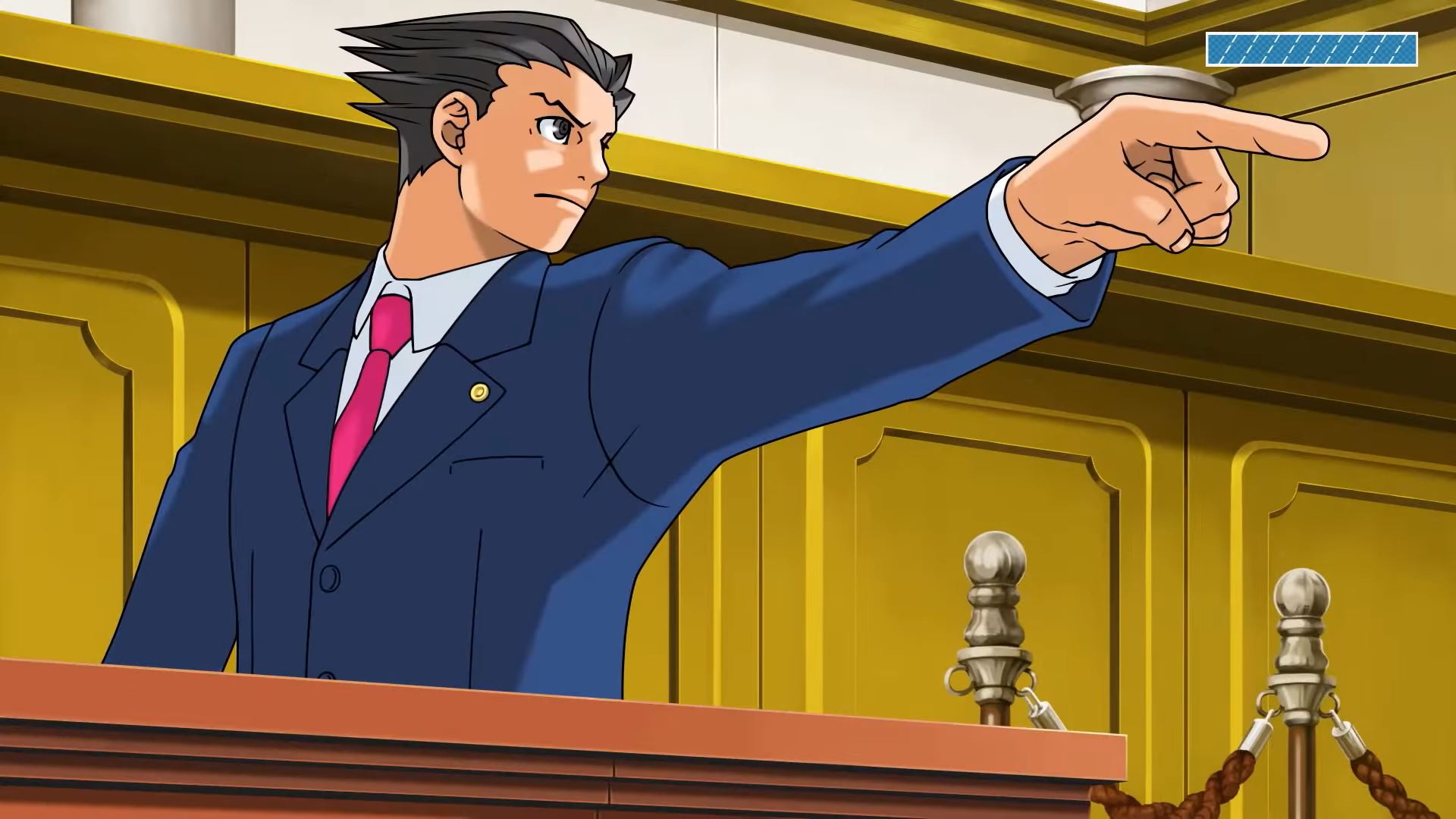Our Verdict
Just what a visual novel should be—fun characters and the rush of solving mysteries make you eager to keep going.
PC Gamer's got your back
What is it? A visual novel that brings anime to the courtroom
Expect to pay $30/£30
Developer Capcom
Publisher Capcom
Reviewed on Core i-5-8400, GTX 1060, 16GB RAM
Multiplayer No
Link Official Site
Before I became familiar with Japanese media, I associated courtroom dramas with the no-nonsense rulings of Judge Judy or the uber-serious suspense of A Few Good Men. Meanwhile, in Japan's fictional courtrooms, the silly and the dramatic is found in equal measure, making it a hugely popular genre. This is especially true of Ace Attorney, which imbues its trials with all the visual and stylistic trappings of an engaging anime serial.
Ace Attorney is the latest in a line of HD remasters of Capcom's previously console-only games. Prior to Ace Attorney, hardly any visual novels were officially localised, and even now it’s still a niche that more commonly brings to mind dating games over adventure. Ace Attorney's courtroom setting and goofy humour still set it apart; both from visual novels and games at large. Trials range from ridiculous to genuinely suspenseful. Rather than just a collection of selectable player reactions, Phoenix Wright is one of the few main characters in this type of game who gets to freely express himself. While he often seems overwhelmed by the shenanigans around him, he genuinely cares—making me care in turn.
You learn everything you need to know to become a winner in the courtroom during your very first case. Fresh from law school, defence attorney Phoenix has promised to get his best friend Larry Butz acquitted of murder. Your clients are generally hapless people like him, and in order to keep them out of jail, you have to identify the true culprit and then—to quote Wright—"put the pressure on until they squeal". First you listen to a witness's testimony, then pick it apart statement by statement during the cross-examination. You can ask a witness to clarify ("Hold it!") or expose inaccuracies and straight-up lies by presenting a piece of contradicting evidence ("Objection!").
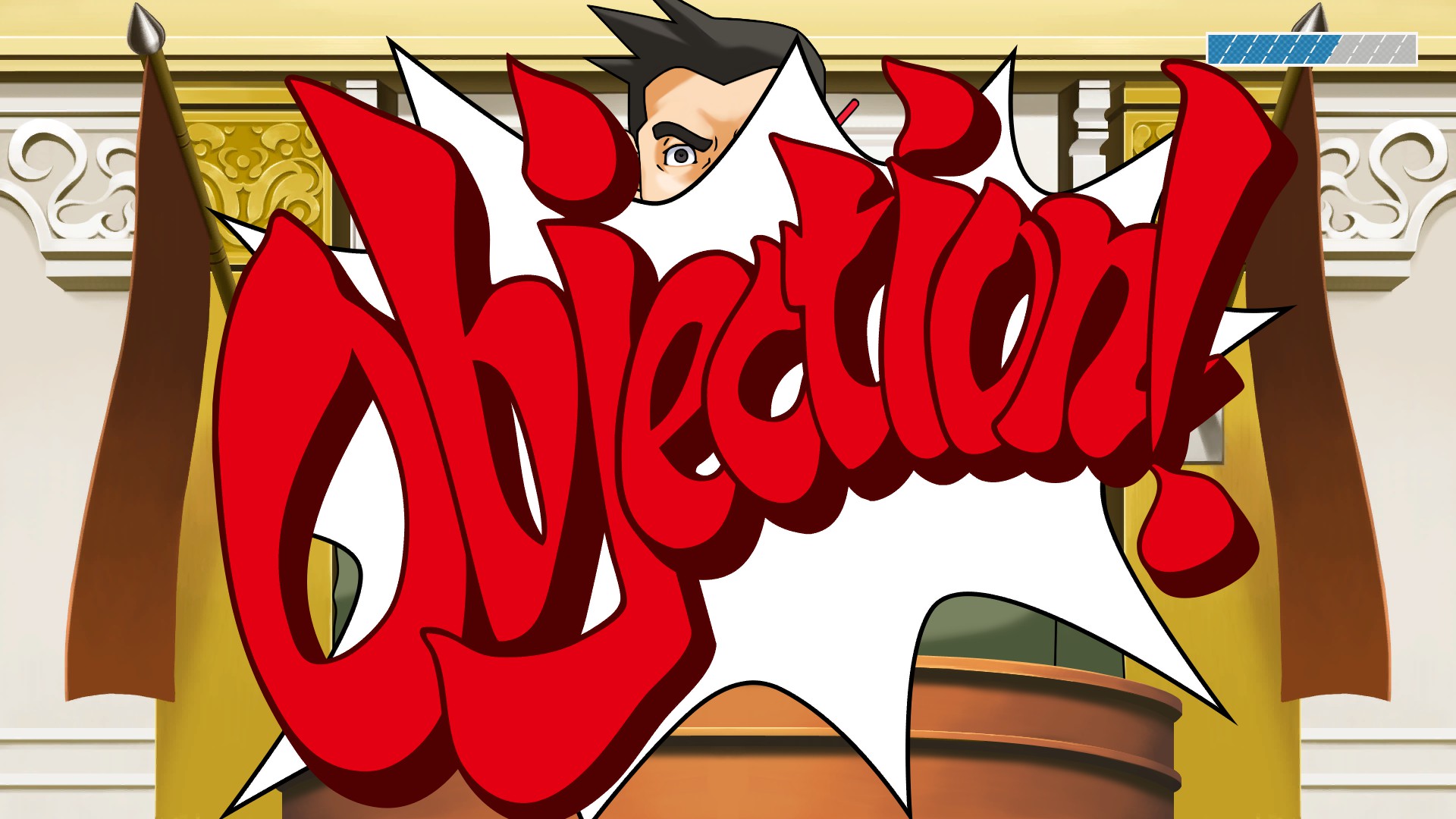
All evidence is handily collected in the court record, which you can access at any time. Presenting evidence can be frustrating however, because not only do you have to present the right piece, it also has to be presented at the right moment. If a witness is elaborating on a prior statement in their next sentence, either seem like viable moments to object, but the game will only acknowledge the right sentence to do so. Get it wrong, and you'll be penalised and lose part of a health bar. The more is on the line, the more health you stand to lose, but you can save at any time from the options menu.
Diagnosis: Murder
Starting with the second of 14 episodes, you also put your Sherlock Holmes hat on and do some sleuthing ahead of a court date. Looking for clues out in the world is an unwieldy affair, as you have to move from screen to screen in a certain order and randomly click just about anything that could be of interest. Sometimes you move about aimlessly without knowing what to do next until a person appears out of nowhere or you've finished all available conversations.
Ace Attorney is a hilarious game, highly dependent on wordplay and overdramatic witnesses
Trials soon turn into lengthy affairs over multiple days, in which dramatic revelations and new evidence regularly provide interesting twists and turns. Yet Ace Attorney isn't just a 'case of the week' affair—over time you come to know an eclectic cast of main characters whose backstories intertwine with the seemingly unrelated cases you're trying to solve. Many episodes over the course of the trilogy involve Wright's assistant Maya Fey, who belongs to a family of spirit mediums who to help with investigations by channelling the dead, for example. Police detective and lovable village idiot Dick Gumshoe is another regular. Of course no trial would be complete without prosecuting attorneys, Wright's opponents in court. In the first game, this role is filled by Miles Edgeworth, a delightfully sour-faced fop who wears actual cravats as part of his everyday outfit. Edgeworth is my new favourite, because how many men do you know, fictional or otherwise, who can rock a magenta suit and a tragic backstory?
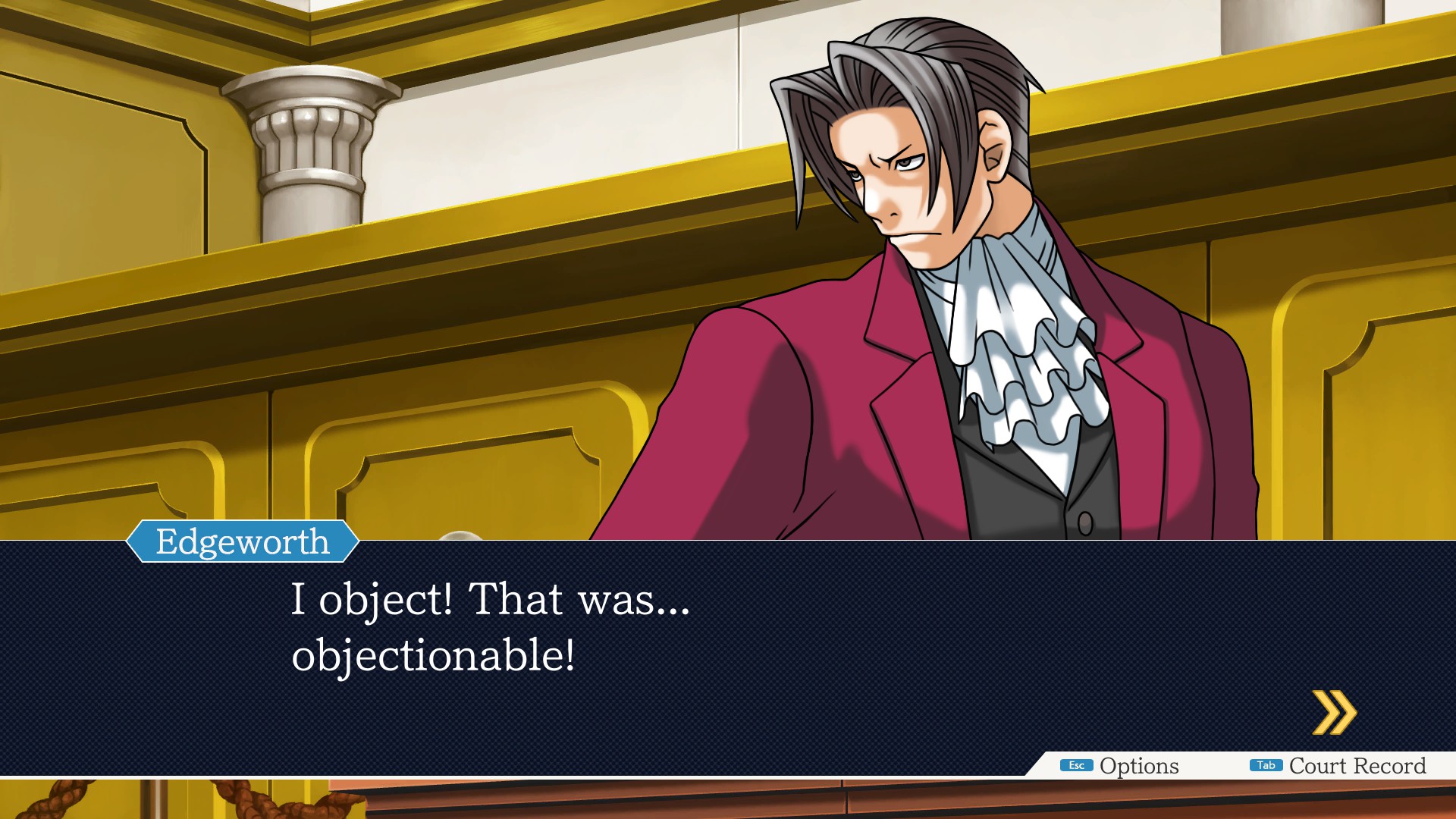
Edgeworth provides a lot of the overarching story's backbone, as do the Feys. Ace Attorney does put a lot of stock in character development, and watching Phoenix relationship with his friends grow over time is heart-warming. As much as these characters grew on me though, the individual cases remained my main source of enjoyment over the course of the three games. Still, I appreciate the interplay between random trials and more personal stories.
Murder, She Translated
The localisation is Ace Attorney's actual star. Ace Attorney is a hilarious game, highly dependent on wordplay and overdramatic witnesses being completely oblivious to the gravity of the situation they find themselves in. There's more than one running gag that stretches over several episodes, and like SEGA's Yakuza series, it's often just Wright's deadpan reactions to everyone else's outlandish behaviour that makes each interaction so much fun. The localisation confers each suspect's linguistic ticks and is overall vital to helping you find out just when they say something that doesn't quite add up.
To help illustrate the scope of influence the localisation has, you just need to look at names in the series. Each character’s name in the original is a pun. Take Phoenix Wright—his first name was chosen for its heroic sound, then modified into "Nick” by several characters, becoming a literal nickname. His original name is Ryuichi Naruhodo, and his surname is actually the Japanese way to say "right” as an affirmation. To justify using English names however, localisation moved the setting of the entire game. A drastic decision in order to accurately localise as many puns as possible, especially when the Japanese setting becomes increasingly obvious in the second and third games, but the frankly ridiculous puns give Ace Attorney its own charm.
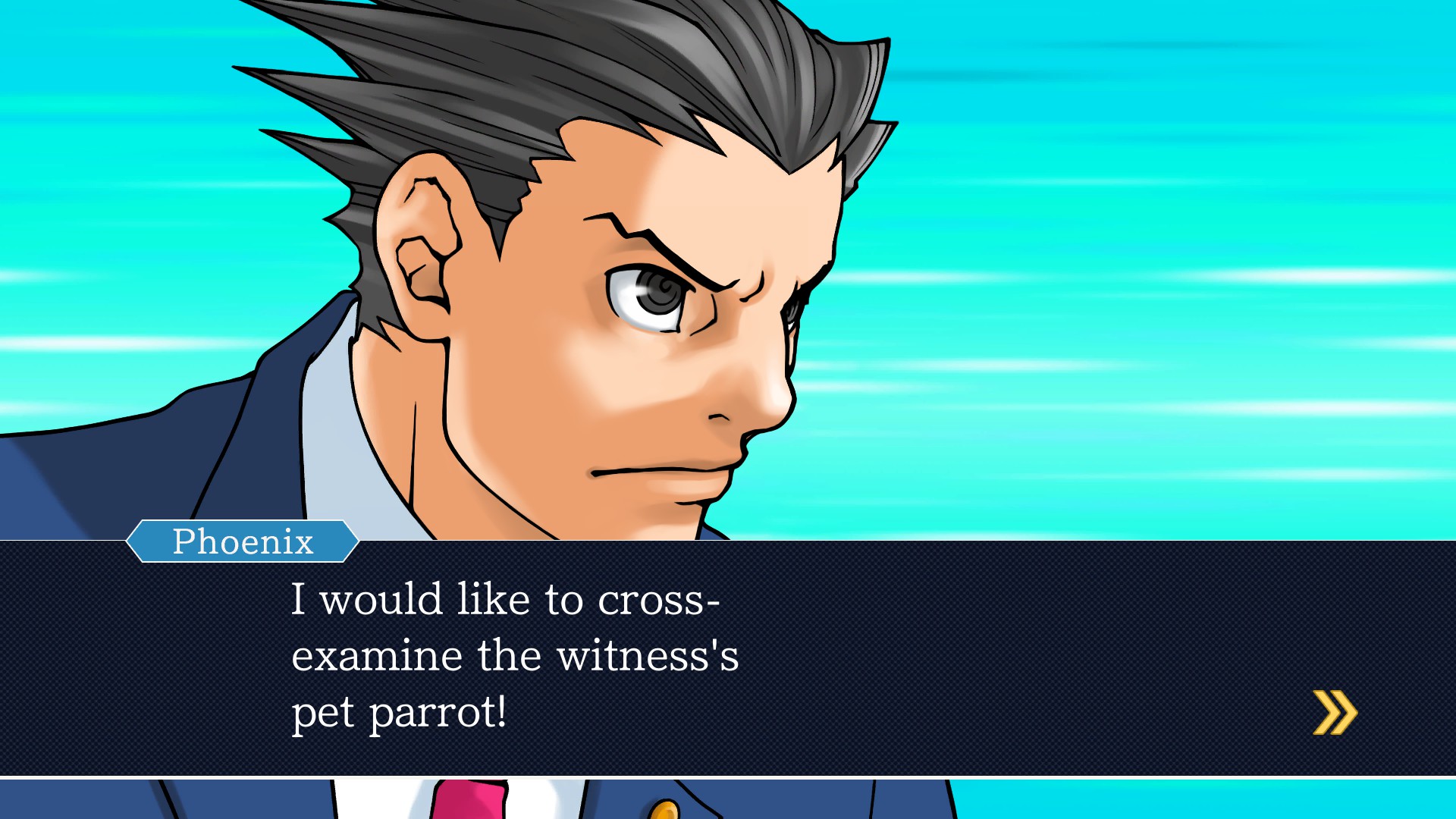
When it comes to having you uncover evidence, Ace Attorney uses a curious combination of very eagerly pushing hints onto you (complete with marking text passages of interest in red), and staying completely schtum. Every piece of evidence you collect will become relevant at some point, but sometimes you only find out by trial and error what Phoenix is referring to. When situations enter the territory of the absurd, cases turn into guesswork. The creative twists that make each criminal case interesting also make them so difficult to puzzle out. Still, Ace Attorney avoids feeling punishing. During my playthrough I only saw the game over screen once.
Anime calls for drama and highly unlikely events the same way it calls for characters with candy-coloured hair
Solving a puzzle feels great, thanks to the frankly smug way in which Wright explains his deductions. Ace Attorney would likely be half as long if Wright didn't announce his breakthroughs in the most dramatic fashion imaginable, followed by a lengthy explanation to make sure everyone's on board. "You want to know what this business card signifies? I'm going to tell you what it signifies!" Clickbait, in my games? Thankfully, a simple button press is enough to skip to the end of a sentence or to have the text run slightly faster.
Of course Ace Attorney wouldn't be the same without these antics. With the HD remaster's smoothed-out sprites, the games look more like an anime than ever before. Ace Attorney also leans more heavily on the tropes associated with anime than most other Japanese games. It's designed like an actual TV series, complete with posters for each episode, end cards that say "to be continued", flashbacks and filler episodes.
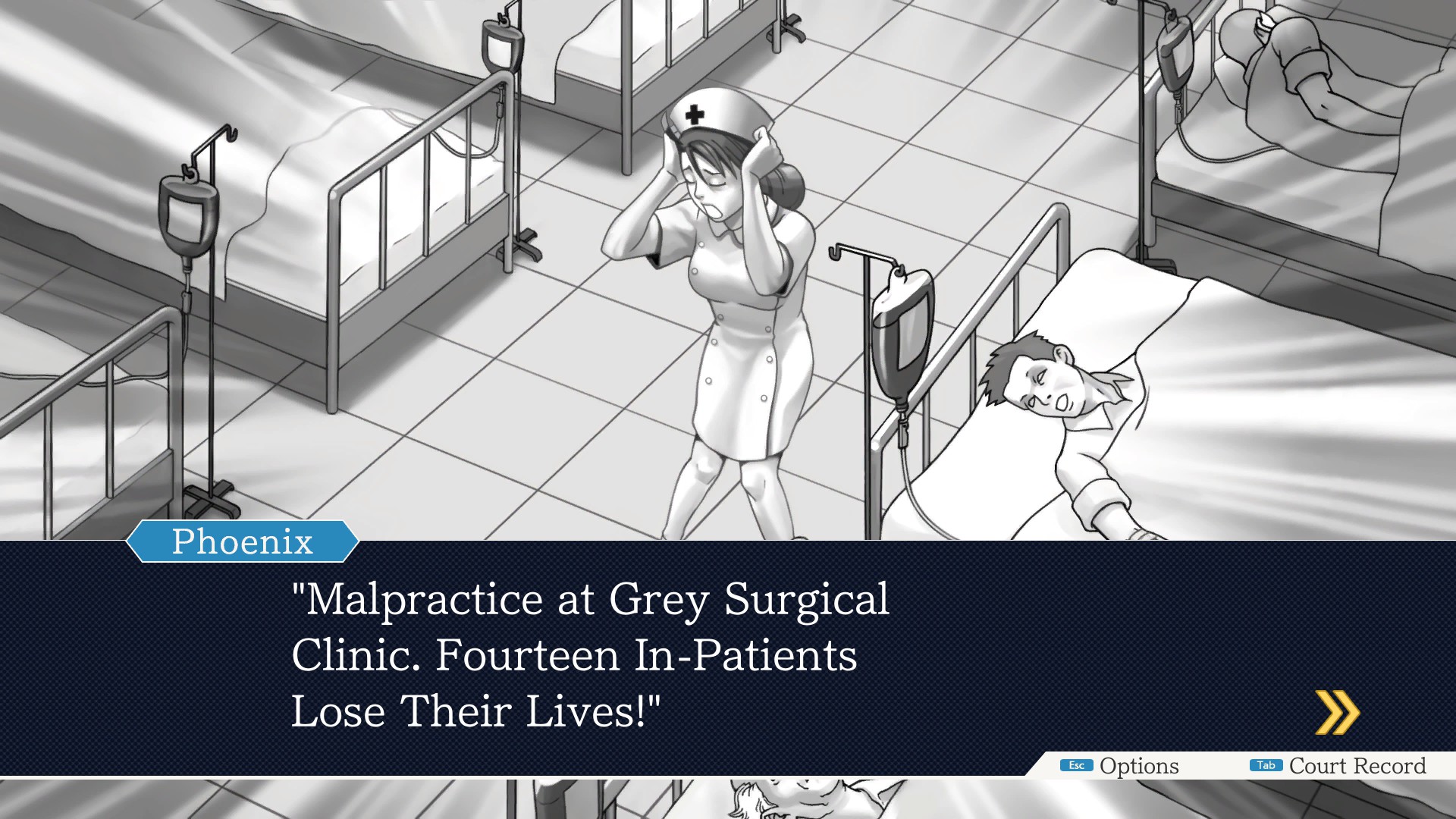
Anime calls for drama and highly unlikely events the same way it calls for characters with candy-coloured hair, and from murder to ghostly possession and kidnapping, Ace Attorney has it all. All the screaming, copious amounts of screenshake (which you can blessedly disable) and characters going "what's the meaning of this?!" can get a bit much, especially when the formula remains virtually unchanged across three games, but it is satisfying to watch suspects become increasingly desperate.
Justice For All adds to elements to the overall formula—the option to use character profiles as evidence, finally putting them to use, and the magatama, a mystic stone that tells you if someone is lying to you during investigations. This allows you to object to people's tomfoolery outside the courtroom and get witnesses to give up their secrets. These are small additions rather than anything new. Had Capcom at any point decided to get rid of them again, I wouldn't have missed them.
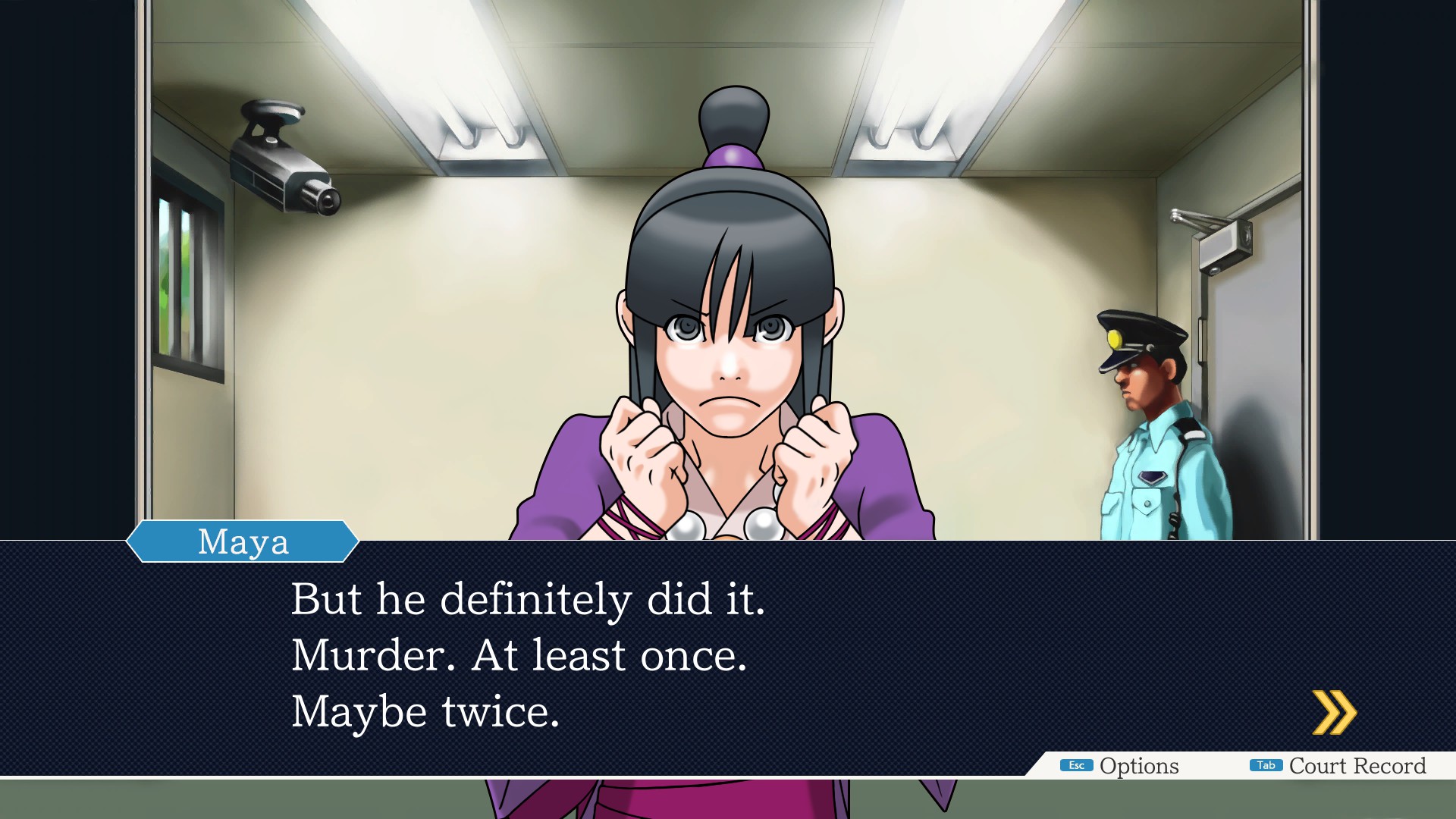
Law and Order
Game number three, Trials and Tribulations, is the weakest of the trilogy. Being 50% flashbacks, it adds context to events discussed in prior games, but the pacing is off. To my mind the episodes would have worked better in between more exciting trials to help that pacing. The tutorial episodes at the beginning of each game are also definitely weaker than others; they take place entirely inside the courtroom and are full of hints.
Despite this, Ace Attorney hooks you the same way any good crime serial does: you want to know whodunit, and how, and once you do, you want to point your finger at the criminal in a heroic fashion and laugh. I dare you not to be sold on Ace Attorney as soon as the verdict hits the screen in big, bold letters, and the room erupts into cheers and confetti.
Just what a visual novel should be—fun characters and the rush of solving mysteries make you eager to keep going.
